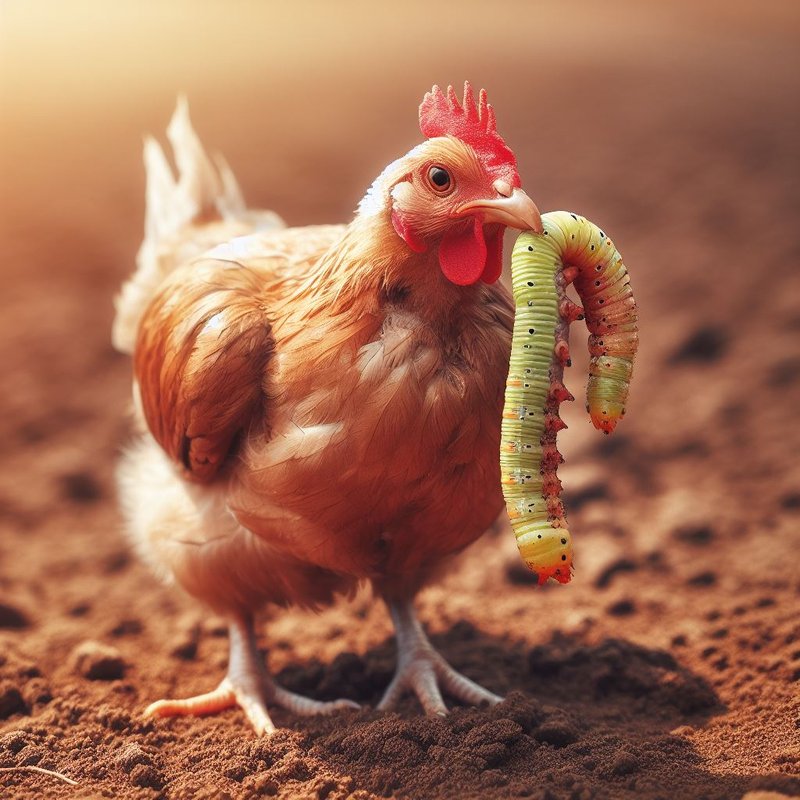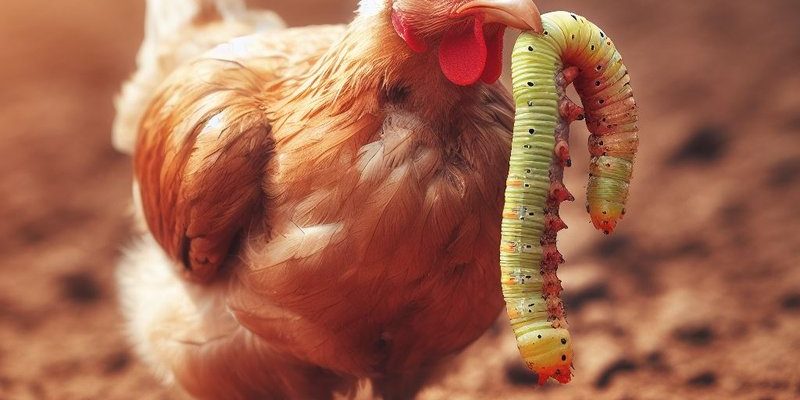
Imagine you’re in a game of tug-of-war. On one side, you have the hornworms devouring your precious plants. On the other side, there’s your flock of chickens, ready to peck and scratch their way to victory. Chickens aren’t just pets or egg producers; they can be valuable allies in organic pest control. Let’s dig into how you can use chickens to manage those hornworms effectively.
Understanding Hornworms: The Bad Guys of the Garden
Hornworms are the larvae of moths, and they love munching on tomato, pepper, and eggplant plants. These green caterpillars can grow quite large, often reaching up to 4 inches long! The bad news is they can quickly strip your plants bare if left unchecked.
One of the most common types you’ll encounter are the Tobacco Hornworm and the Tomato Hornworm. They blend in well with the leaves, making them tricky to spot at first. If you see large frass (a fancy word for caterpillar poop) below your plants, that’s a sure sign that hornworms are nearby. You might be wondering, how harmful can these little monsters really be? The truth is, they can devastate your garden in just a few days if you don’t take action.
Why Chickens? The Natural Pest Control Solution
Here’s the thing: chickens are natural foragers, and they love to snack on various pests, including those sneaky hornworms. In fact, their wide-ranging diet includes bugs, worms, and even small rodents. By introducing chickens into your garden, you’re effectively employing a natural army against pests.
Chickens are also great at breaking the pest life cycle. When they scratch through the soil and foliage, they not only eat hornworms but also their eggs and larvae. This kind of predatory behavior can significantly reduce hornworm populations and other garden pests over time, leading to a healthier, more productive garden.
How to Introduce Chickens to Your Garden
You might be wondering how to get started with using chickens for hornworm control. The first step is to make sure your chickens are comfortable in their new environment. Here’s a simple plan you can follow:
- Choose the Right Breed: Some breeds are better for foraging than others. Look for active breeds like Rhode Island Reds or Leghorns.
- Build a Safe Space: Chickens need a secure area to roam. Make sure your garden is surrounded by a fence to keep them safe from predators.
- Supervise Their Time: When first introducing them to your garden, keep an eye on them. This helps prevent any unintended damage to your plants.
Chickens will need time to adjust and learn where the best snack spots are—namely those hornworm hideouts!
Best Practices for Using Chickens in Your Garden
Using chickens in your garden isn’t just about letting them roam free. There are a few best practices to keep in mind for optimal hornworm control:
1. Rotate Their Grazing Area: Chickens should have access to different sections of your garden to prevent overgrazing. This helps keep the soil healthy and gives plants time to recover.
2. Monitor Their Diet: While chickens love to munch on pests like hornworms, make sure they’re getting a balanced diet. Supplement their foraging with high-quality feed to maintain their health and egg production.
3. Watch for Other Pests: Hornworms aren’t the only pests chickens will help control. They’ll also feast on other harmful insects. So while you’re fighting hornworms, you can tackle other garden invaders too!
4. Be Mindful of Your Plants: Keep an eye on delicate plants that might be damaged as chickens scratch around. You can create barriers or use row covers for vulnerable crops.
The Challenges of Using Chickens for Pest Control
Even though chickens can be a powerful tool against hornworms, there are some challenges you should be aware of.
First, if you live in a densely populated area, zoning laws may limit how many chickens you can keep. Plus, keeping chickens requires commitment. They need daily care and regular maintenance, so make sure you’re ready for that responsibility.
Additionally, chickens can sometimes become a bit too enthusiastic. They might peck at leaves or dig up seedlings. It’s essential to strike a balance between letting them forage freely and protecting your plants.
Companion Planting: A Helpful Strategy
Alongside chickens, you might want to consider companion planting to enhance your pest control efforts. Some plants can naturally repel hornworms and other pests while boosting the health of your garden.
For instance, basil planted near tomatoes can deter hornworms. Similarly, marigolds add a vibrant splash of color while also warding off various pests. By combining companion planting with your chicken strategy, you’ll create a more resilient garden ecosystem.
Final Thoughts on Chickens and Hornworm Control
Integrating chickens into your gardening routine for hornworm control can be a fun and effective solution. Not only do you help manage those pesky pests, but you also get the added benefits of fresh eggs and a delightful backyard atmosphere. Just remember, it’s about teamwork—balance your chickens’ foraging habits with care for your plants, and monitor how everything works together.
In the end, you’re not just creating a garden; you’re fostering a little ecosystem where chickens do their part to keep your crops healthy and thriving. So grab a cup of coffee, relax, and watch as your feathered friends help you combat hornworms in a natural, enjoyable way!

